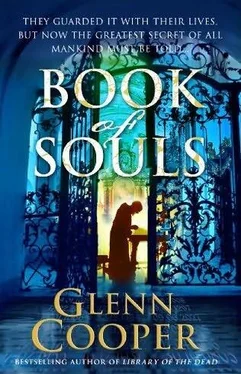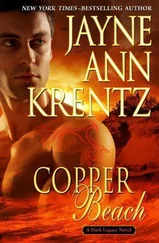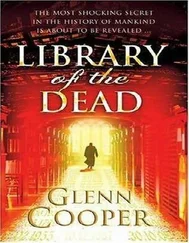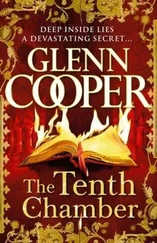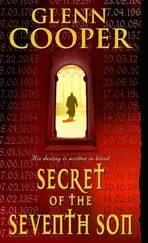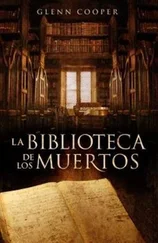Glenn Cooper - Book of Souls
Здесь есть возможность читать онлайн «Glenn Cooper - Book of Souls» весь текст электронной книги совершенно бесплатно (целиком полную версию без сокращений). В некоторых случаях можно слушать аудио, скачать через торрент в формате fb2 и присутствует краткое содержание. Жанр: Триллер, на английском языке. Описание произведения, (предисловие) а так же отзывы посетителей доступны на портале библиотеки ЛибКат.
- Название:Book of Souls
- Автор:
- Жанр:
- Год:неизвестен
- ISBN:нет данных
- Рейтинг книги:5 / 5. Голосов: 1
-
Избранное:Добавить в избранное
- Отзывы:
-
Ваша оценка:
- 100
- 1
- 2
- 3
- 4
- 5
Book of Souls: краткое содержание, описание и аннотация
Предлагаем к чтению аннотацию, описание, краткое содержание или предисловие (зависит от того, что написал сам автор книги «Book of Souls»). Если вы не нашли необходимую информацию о книге — напишите в комментариях, мы постараемся отыскать её.
Book of Souls — читать онлайн бесплатно полную книгу (весь текст) целиком
Ниже представлен текст книги, разбитый по страницам. Система сохранения места последней прочитанной страницы, позволяет с удобством читать онлайн бесплатно книгу «Book of Souls», без необходимости каждый раз заново искать на чём Вы остановились. Поставьте закладку, и сможете в любой момент перейти на страницу, на которой закончили чтение.
Интервал:
Закладка:
He sat on his bed, broke the seal and read with horror:
Dearest Son,
A mother should never be suffered to write such a letter, but I must inform you that your father and brother are dead. The tragic circumstances have overwhelmed me, and I pray you to return at the earliest to take charge of your father’s estate as the next Baron of Wroxall. Your father and William argued over some matter, and there was a violent struggle whereupon your father fell into the fire in the Great Hall and was burned on his shoulder. The burn healed not and led to a fever from which he died. William was much grieved, and by his own knife he took his own life. I am stricken with woe and misery and beg you to speed yourself back to my bosom,
Elizabeth
Twenty-three years later, in 1555, the old plague doctor sat in his attic study composing a letter. It was after midnight, and the streets of Salon-de-Provence were quiet, allowing him full concentration. This was his special time, when his wife and six children were in bed and he could happily work as long as he liked or until sleep overtook him, sending him tottering over to his study cot.
He had long since Latinized his name to Nostradamus as he imagined it sounded weightier and indeed, he had a reputation to nurture. His Almanacs were selling in large numbers throughout France and neighboring countries, and his fortune was growing. He no longer practiced his apothecary skills or medicine, instead turning his full attention to the more profitable life of an astrologer and seer.
Now, he held in his hand a copy of his new work, one which he hoped would bring him more notoriety, more accolades, and more money. The book had been printed in Lyon and would soon go on sale. His publisher had delivered a crateful of copies, and he took one of them and with his sharpest knife, cut away the title page: LES PROFITIES, DE M. MICHEL NOSTRADAMUS.
He dipped his quill and continued his letter.
My dear Edgar
M. Fenelon, the French ambassador to England, informs me you are well. He tells me he visited with you at Whitehall Palace and that you have a good wife, two daughters, and a fine and prospering estate. I have consulted my charts and my bowl and you will certainly be graced with sons before long.
I could not be happier as you remain my English cousin who holds an esteemed place in my heart. As you well know, your Vectis book and papers have had a profound effect on my life and my endeavors. Knowing my lineage has given me the confidence to accept my visions for what they are, true and bona fide prophecies of great utility for all mankind. I have since desired to serve the public by using my skills to warn and educate princes and the masses alike what will become of them.
My own life has been reborn of late. My first wife and two dear children perished most cruelly from the plague, and with all my skills, I was powerless to save them. I have since remarried and my wife has borne three sons and three daughters who are a joy to me. I have recently published the first of my Prophecies, a great undertaking in which I am endeavoring to set out my predictions for many centuries to come in the form of one hundred quatrains for the interest and instruction of all who read them. I enclose the face page from the book for your amusement and I trust you will purchase a copy when it comes on offer in London. I have kept your family secret as you have asked me, and I likewise ask you to keep mine. You alone know that I am a Gassonet, and you alone know that the strange blood of Vectis flows through my veins.
Michel Nostradamus, 1555
Chapter 24
1581
Wroxall
Edgar Cantwell looked and felt like a very old man. At age seventy-two everything had turned gray, his hair, his beard, even his shriveling, silvery skin. He was bothered by painful ailments from his abscessed jaw all the way down to his gouty toe, and his disposition was chronically sour. His main pleasures were sleeping and drinking wine, and he spent the lion’s share of his days in both pursuits.
His daughters Grace and Bess were solicitous to him, and their husbands were tolerable fellows, he supposed. His youngest boy Richard was a good, studious lad, already proficient in Greek and Latin at the age of thirteen but he could not look upon his fair head without thinking of the boy’s mother, who died of puerperal fever when he was only two days old.
But it was his oldest son, John, who was the bane of his existence, a source of anger and irritation. The nineteen-year-old had progressed to be no more than a drunk and a braggart who seemed to treat everything Edgar held sacred with an air of contempt.
He dimly recalled that in his day he had been a rebellious lad with a streak of licentiousness, but he had always obeyed his father and acquiesced to his wishes, even toddling off like a dumb lamb to slaughter to attend that horrible Montaigu.
His son did not subscribe to this kind of filial respect and obligation. He was a child of the times, his head turned by the trappings of Elizabethan modernity-dandyish clothes, frivolous music, theater troupes, and a far-too-cavalier approach to the serious business of God and religion. As far as Edgar was concerned, his son had more respect for a jug of wine or a lass’s rump than his father’s desires. If only Richard were the eldest, he would not have so dreaded the state of his legacy.
His legacy, he felt, was especially worthy of protection because he had labored so assiduously his entire life for Crown, for country and for Cantwell, and he was not about to blithely hand over his hard-acquired influence to a drunken fool. Thrust into baronial responsibilities immediately upon the untimely death of his father, he had begun a career as a public man who was forced carefully to navigate the treacherous waters of state politics.
When he returned to England in 1532, King Henry had already, unbeknownst to Edgar and indeed most of his subjects, secretly married Anne Boleyn, and thus begun his great conflict with Rome, seeking an annulment of his first marriage to Catherine. These were busy days for Edgar, who committed himself to taking charge of his estate, building his private chapel, his miniature Notre Dame, as a tribute to his murdered father, assuming a position befitting his legal education on the Council of the Marches, and finding a suitable wife.
The breaking of the chains that bound England to Rome occurred little by little, a succession of political moves and countermoves that culminated in Edgar’s first great crisis when, in 1534, Parliament passed the Act of Supremacy making it high treason to refuse to swear that Henry was the Supreme Head on Earth of the Church of England.
Edgar pledged his affirmation especially quickly because he was aware of rumblings at Court about the papist shrine he was erecting at Wroxall. He was a good Catholic, to be sure, but his years at Paris, his friendship with Jean Calvin, and his secret knowledge of the certainty of predestination made him sufficiently “protestant” to convince himself he was not condemning his soul to damnation and hellfire by siding with the king in his Great Matter.
King Henry prodded Cromwell, and Cromwell prodded Parliament, and link by link the chain between England and Rome was separated until it was done in 1536. The Act Against the Pope’s Authority drove the last nail into the coffin. England was the Reformer’s country now.
Edgar married Katherine Peake, a homely woman from a substantial family, but she died in stillborn childbirth and left him a childless widower. He threw himself into his work and became in succession a judge at the Quarter Sessions Court, then the Great Sessions Court, where he rose to chief judge. To a degree, his fortunes swelled and deflated with the rise and fall of King Henry’s third wife, Jane Seymour, since the Seymour family had blood connections to the Cantwells. But when her son, Edward, ascended to the Crown in 1547 and Jane’s brother, Edward Seymour, became Lord Protector, Edgar was blissfully elevated to the House of Lords and the Privy Council.
Читать дальшеИнтервал:
Закладка:
Похожие книги на «Book of Souls»
Представляем Вашему вниманию похожие книги на «Book of Souls» списком для выбора. Мы отобрали схожую по названию и смыслу литературу в надежде предоставить читателям больше вариантов отыскать новые, интересные, ещё непрочитанные произведения.
Обсуждение, отзывы о книге «Book of Souls» и просто собственные мнения читателей. Оставьте ваши комментарии, напишите, что Вы думаете о произведении, его смысле или главных героях. Укажите что конкретно понравилось, а что нет, и почему Вы так считаете.
